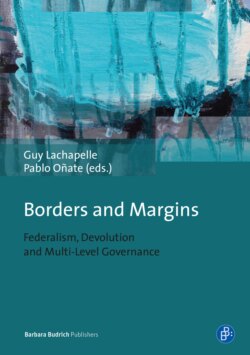Читать книгу Borders and Margins - Группа авторов - Страница 19
На сайте Литреса книга снята с продажи.
MLG versus multinational federalism
ОглавлениеIn recent years, this debate has shifted somewhat to a comparison between multilevel governance and multinational federalism. The exponents of the latter (multinational federalism) view MLG as a concept which gives priority to the underlying values of efficiency and political stability rather than community or justice for its minority national groups and citizens. Therefore, as an analytical tool, MLG is viewed as biased in favour of the dominant elites and the status quo (Gagnon 2011). This critique of MLG is one which is focused on normative rather than analytical and empirical differences between the two concepts. Although important, due to lack of space, we will be unable to address these normative concerns in this paper.
In our view, “federalism” and “multilevel governance” share a number of common characteristics. They both can be understood in at least three distinct ways: 1) as descriptive terms applied to concrete political systems, 2) as analytical/empirical constructs, and 3) as normatively positive or desirable forms. With respect to the first (concrete systems) they each perform similar political functions, including that of dividing power in order to combat authoritarianism, managing conflict and promoting cooperation between internal groups, and protecting minority rights. They have also both increasingly abandoned an exclusive emphasis on territoriality in devising methods of political representation, and now opt for a combination of territorial and functional bases of representation in the performance of political decision-making tasks. There has also been a notable trend toward increased emphasis on ethical and normative [36] concerns (or both) in decision-making, increased stress on the whole person rather than on the atomistic individual in societal action, and less attention to statist and hierarchical models of administration. However, as analytical and empirical constructs, the two concepts still have some important differences, such as: 1) federalism has a narrower and more restrictive reach than MLG, 2) federalism encourages greater formalisation of policy decisions and processes, 3) federalism fosters a broader climate of competitiveness, and 4) federalism tends to produce a more efficient, less costly and less time-consuming problem-solving governance process than MLG (Stein and Turkewitsch 2008).
